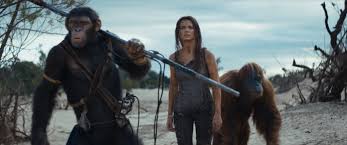


The phrase “spectacularly pointless” hangs over the tenth “Planet of the Apes” movie, a stand-alone sequel to “War for the Planet of the Apes,” which came out seven years ago.
Granted, I was thinking “umpteenth” in terms of the actual number of these films just as it began. And “What is the point of that?” cropped into my head watching the trailer to “Alien: Romulus” preceding the latest 20th Century Studios apes outing. That question lingered all the way through this 143 minute meander through CGI.
“Kingdom of the Planet of the Apes” features a lesser known cast, unfamiliar voices and motion-captured actors acting characters in a generic “hero’s journey” with a vague if not downright inane destination. Just figuring out who is whom and what their purpose in the saga is can be a struggle. Thankfully, the wearily predictable story beats solve those problems, if not the ones presented by “Who should we root for?” and “Why should we care?”
Visual, verbal and character references to earlier “Apes” films as well as “Water World” and assorted other sci-fi spectacles abound.
But little of it makes a lick of sense in a film that might be akin to the “last” “Apes” movie of the first 1970s run of the franchise, “Battle for the Planet of the Apes” — something of a placeholder film for any “Apes” ideas — films or series — to follow, should anybody believe that’s a good idea.
“Some generations” have passed since the death of the viral ape who led the planet’s simian takeover, Caesar. Apes have bent their society towards hunter-gatherers, with horses, tools, multi-story huts, and for the Eagle Clan, birds they’ve somehow trained in falconry.
Their separation from the human race seems complete, as mankind is almost extinct. But that doesn’t mean that conflict has ended. The strong prey on the weak, which is how the Eagle Clan village is sacked and most of its inhabitants taken hostage by the monkey minions of King Proximus Caesar (Kevin Durand).
Son of a falconer Noa (Owen Teague of the “It” movies) promises his dying dad that he will find the tribe and “bring them home.”
Encounters with a wayward human (Freya Allen of TV’s “The Witcher”) may have led the raiders to their village. As Noa tracks the captors, she tracks him. And along the way, he meets the sage orangutan Raka (Peter Macon, the standout in the cast), a member of the ancient Order of Caesar, scholars, worshipers of Caesar doing “the work” of maintaining their oral history until they can figure out how this “storing” knowledge in these things called “books” works.
Raka laments the loss of “herds” of humans, their fate as mute “scavengers” who once walked with apes as equals (there’s a lot of history he wouldn’t know), and preaches “compassion” when the starving, silent but still-dressed human woman falls in with them.
“We will name her ‘Nova.’ We name them all ‘Nova.’ I know not why.”
That’s the lone bit of humor in VFX-guy turned directorWes Ball’s movie (he did some “Maze Runner” pics). His film takes pains — too many pains — to reintroduce us and immerse us in Apeworld, where ruined high-rises are covered in foiliage and the one recognizable landwork is that space age LAX “theme building,” also covered in greenery.
The landscapes, forest and CGI apes are next level realistic, and cost so much to get just right that we get scene after scene slowly setting up the rituals of this “new” society before the movie starts as that society is burned and kidnapped out of existence.
The “kingdom” that Proximus has founded from all these slaves is seaside, in a graveyard for ships and close to something the humans buried that he might might useful for world conquest.
The film’s “placeholder” label doesn’t just refer to the status quo ante that the story attempts to circle back to. Conflicts are arbitrary, and the brawls are perfunctory, “action beats” as defined in third year screenwriting classes. This Nova isn’t mute. And when she meets a human aide to Proximus (William H. Macy needed the money), they have a lot to talk about.
But the overarching gripe here is that initial one I brought up. What is the point? Pierre Boulle’s 1960s source novel touched on race and colonialism in a metaphorical sense. More recent films has grasped ecology and planetary degradation as driving themes behind humanity’s careless collapse and the rise of the apes and “Caesar’s Law.” Guns are introduced, but not politicized. Conflict is imposed, but the non-violence one half expects to see advocated is given a thought and abandoned.
There’s little hint of anything “deep” or “thoughtful” here. This is a dystopia whose origins we might remember, but whose teachable moments and “hope for a better tomorrow” elements are abandoned as we watch the apes climb for eagle eggs, and for their liberty, and chase and fight the enormous gorillas for some unclear notion of “freedom.”
It’s lovely to look at. But that leaden, endless time-suck of an opening act is a fatal flaw that “Kingdom” never overcomes. And two and a half hours is a helluva long time to take to get to a point, not that they ever do.
Rating: PG-13, violence
Cast: The voices of Owen Teague, Kevin Durand, Lydia Peckham, Peter Macon, Travis Jefferey, with Freya Allen and William H. Macy
Credits: Directed by Wes Ball, scripted by Josh Freedman. A 20th Century release.
Running time: 2:23

